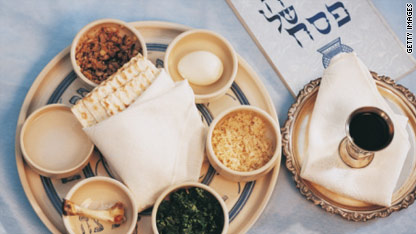Passover health: Matzoh, soup and family

By Elizabeth Landau
CNN.com Health Writer/Producer
For Jews, Passover is somewhat like Thanksgiving: Families and friends gather to eat a lot of food. This holiday, commemorating the exodus of the Jewish people from slavery in Egypt, began Monday and lasts for eight days, during which observers do not eat any leavened bread or various grains. Some traditionally also avoid beans, corn, and other starches.
The Passover meal - called a "seder," meaning "order," - traditionally happens on the first night, during which participants go through a series of symbolic foods representing elements of the Passover story. Some families have a seder on the second night also.
Some seder foods carry health benefits. And one, perhaps the best known of the seder elements, may cause some digestive issues.
Matzoh, which Passover observers eat to symbolize the Jewish people fleeing their homes without enough time for their bread to rise, is actually quite constipating, although no one knows exactly why. There's only about 1 gram of fiber per piece of matzoh, so it's certainly not helping in that area. But dried fruit, thought to be an antidote, is also kosher for Passover, notes Joe Regenstein, professor of food science at Cornell University in Ithaca, New York. "As long as you drink enough water and eat enough fiber to move things, you’re probably OK," says Dr. Lisa Bernstein, assistant professor at Emory University School of Medicine. There is also whole wheat matzoh available, contributing to good carbs and healthy fats, she says.
Matzoh ball soup: A 2009 study in the American Chemical Society's Journal of Agricultural and Food Chemistry showed that chicken soup, otherwise known as "Jewish penicillin," may have medicinal properties. Researchers gave proteins from chicken legs' collagen to rats. In the rats used to model hypertension, blood pressure went down, researchers said. This line of research is credible and may explain the benefits of this "Jewish penicillin," Regenstein said.
Charoset, a paste made of apples and nuts, symbolizes the mortar used to lay bricks in Egypt (legend has it that Jewish slaves built pyramids; some historians have debunked this, and it remains controversial). Walnuts are high in omega-3 fatty acids, Bernstein notes, which have been shown to be good for your heart, vision, and even memory. If this is your first seder and you are allergic to nuts, though, make sure to steer clear.
Family, as with any major food-focused holiday, is a big part of Passover. There are always some issues with that - dealing with relatives you haven't seen a long time, making sure everyone gets along - but for most people, having the family reunited is a positive thing. A 2002 review of research on family routines and rituals, published in the Journal of Family Psychology, found that family rituals, including Passover and Thanksgiving, contribute to stability in stressful times. These, as well as routines such as a family mealtime, are linked with everything from academic success to children's health and strong family ties.
http://pagingdrgupta.blogs.cnn.com/2010/03/29/passover-health-matzoh-soup-and-family/





1 comment:
Great post ! Great content . Very informative . Thanks for the share .
birthday party supplies
Post a Comment